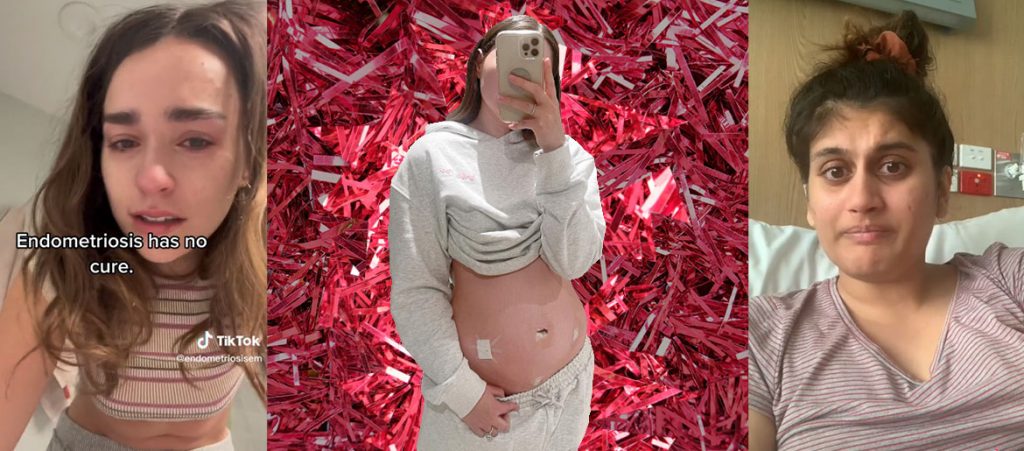
Here’s a question for you: how good do you think your mental health would be if you lived with constant, yet unpredictable, bouts of excruciating physical pain? This is the reality for one in nine Australian women with endometriosis; the chronic illness is much more than just physical pain. Studies show that women with endometriosis are twice as likely as the general population to have depression, and vice versa, women with depression have been found to be twice as likely as the general population to have endometriosis. Clearly, endo takes a heavy psychological toll that we should talk about much more.
The diagnosis rollercoaster
Getting a diagnosis can be an emotional, and expensive, process that may take up more than seven and a half years. This year, period pain relief company Ovira conducted their ‘Big Bloody Survey’ to examine the state of menstruation in Australia, surveying over 1100 people. They found that while four in five respondents have sought advice from a medical professional to manage their pain, three in five did not find this advice beneficial.
Ovira’s founder Alice Williams has endometriosis, and told us her personal diagnosis journey was frustrating. “The first time, they just said I was constipated and needed to take Metamucil. And then I went on this whole journey. But when you’re a young teenage girl, you put 100% trust in the GP and it didn’t even cross my mind that maybe this isn’t the best advice.” Unfortunately, it’s not uncommon to feel like you’re being gaslit about your pain. Alice says her doctors refused to believe her concerns about her pain, prescribing her antidepressants instead. “Looking back now, I was not depressed. I was just physically going through hell, which obviously affects your mental health,” she says.
From a young age, we are taught that periods come with a certain amount of pain by default. What we aren’t taught is how much pain is too much. Should I be fainting during my period or be in pain whilst having sex? Normalisation of period pain from both patients and doctors can lead to delayed medical attention and diagnosis. The symptoms of endometriosis, such as pelvic pain, heavy menstrual bleeding, and infertility can be similar to other conditions like pelvic inflammatory disease (PID) or irritable bowel syndrome (IBS), leading to misdiagnosis or delayed diagnosis for these conditions too.
According to Endometriosis Australia, the only way to definitively diagnose someone with endometriosis is via laparoscopy, an invasive and expensive procedure that carries a myriad of life-altering risks. Other diagnostic tools – like internal ultrasounds, which are traumatic in themselves – are not always effective in detecting endo. Still, patients who choose not to go down this invasive path due to financial, emotional or cultural reasons risk further delaying a diagnosis.
Throughout the diagnosis journey, you’re experiencing severe pain and symptoms while being expected to endure another invasive or expensive test to reach a diagnosis you’re not sure exists. The uncertainty, frustration and lack of clarity can cause serious anxiety and take a toll on your mental health.
A bleak treatment outlook
Even once you’ve secured an endometriosis diagnosis, the journey doesn’t exactly get easier. As endo has no cure and everyone responds differently to treatment, the process of easing your symptoms and reducing growths is done by trial and error…
Let that sink in: relieving the excruciating pain of 190 million women around the world is based on trial and error.
The options include hormonal therapies such as oral contraceptives, progestin-only pills, and gonadotropin-releasing hormone (GnRH) agonists, which can be used to manage the symptoms. However, they can also cause side effects such as mood changes, weight gain, and fatigue. Other options include complete hysterectomies (which still isn’t guaranteed to cure your pain), anti-inflammatory diets, multiple laparoscopies, at-home remedies including stretches, hot water bottles, and basically anything you think might make the pain stop.
For now, working through this list of ‘might-work’ options is what endo patients have to look forward to for their entire lives. The lack of stability in return for short-term pain management is a frustrating and, frankly, hopeless journey. Is it surprising our mental health takes a hit?
Even when new customers first try Ovira’s pain-relief device, Alice says they often come with a sense of distrust. “So many things are pushed on us, especially when it comes to Endo, like ‘yoga will fix it’ or ‘peppermint tea will help’. So if someone suggests Ovira, your initial reaction will be ‘as if this is going to be able to help my endo pain’ – because [the pain] is so extreme.” Trying to figuring out a treatment plan when there is no end in sight will not only make you frustrated, but can leave you feeling cynical about the world around you.
Endometriosis is often ignored as a public health priority. In 2021, America’s National Institutes of Health (NIH) reported spending $20 million on endometriosis research. In the same year, the NIH reported research spending on diabetes of $1.1 billion. In the UK, endometriosis is still not listed as a research priority with the UK National Institute for Health Research or any other major funder.
Endometriosis research in Australia has also historically been underfunded, but there has been a recent increase in funding and attention. Since 2018, Australia has committed $29 million to endometriosis research, as part of the $87 million allocated to the National Endometriosis Clinical and Scientific Trials (NECST) Network. It sounds like a big number, but reproductive health researcher Dr Mike Armour says the “cost of illness burden on society for endometriosis, in Australia alone, is about $24 million a day.” This includes time off work, surgery, treatment, and testing bills. With this context, the funding only covers three and a half days’ worth of financial impact.
A greater focus on endometriosis research not only means getting closer to a cure and reducing the stress and ongoing financial burdens on individuals, but could also save millions in lost productivity across society.
An isolating illness
Whilst you struggle to deal with your chronic illness, the people around you may be struggling with it too. Chronic fatigue is a very real symptom of endometriosis. On top of the debilitating pain, the time commitment of treatment and testing demands, people with endo don’t always have the bandwidth to be a great partner, friend, or employee. Bailing on birthdays, dates, and having to take days off work are common sacrifices many endo patients have to make.
Endometriosis is among the 20 most painful medical conditions, alongside cancer, appendicitis, and childbirth. But explaining this to someone who hasn’t experienced anything like it (in a society that disregards women’s pain) is difficult. This illness can make it almost impossible to maintain relationships, romantic or otherwise. How are you supposed to connect with someone, when you feel like no one can understand you? The unavoidable isolation can have an incredible impact on an already dwindling mental view of the situation, at a time when you ironically need a support system the most.
Although it’s said that endo mostly affects people around their ‘reproductive years’, that relies on being diagnosed. In reality, this emotionally-taxing journey starts in your late teens. It is meant to be a time of self-discovery, but for endo patients, it’s hard to know who you are when all you can focus on is the pain.
In the Bloody Big Survey, 66% of respondents said every period renders them unable to complete everyday tasks. This includes simple activities like brushing your teeth, getting dressed, feeding yourself, and showering – common symptoms of depression. “When you are going through so much pain, you’re missing out on your social life, it’s affecting your work life, your diet, your health. You don’t shower for like, five days. Your physical appearance and your view of yourself, when you are at the end [of your period], is pretty low. It 100% affects your mental health,” Alice says.
A BBC survey even found that about 50% of women with endometriosis experienced suicidal thoughts or feelings related to their illness. “When I’m going through a flare, it’s like I can’t do anything, I can’t think about anything. I literally just switch off. My brain goes from this massive, multifaceted thing to just literally the size of a pea.”
@misssimmyp Womens health can be so lonely and make you question yourself constantly. Here’s to trying to be less harsh on ourselves and believing how we are feeling #womenshealthcare #womenshealthmatters #youremotionsmatter #endolife #surgerycheck ♬ original sound – Simran Pasricha
Easing the burden
It’s clear that mental health needs to be made a priority in treatment of endometriosis. Not only including it as part of the treatment plan, but tackling the issues that contribute to the psychological hardship. Endometriosis Australia wants increased investment in all areas that the government’s endometriosis package covers, particularly in “communication, training, and collaboration with medical professionals across the entire health sector.”
CEO of Endometriosis Australia, Alexis Wolfe, told SBS News: “Ensuring that all the way through from GPs to stenographers, to emergency departments, to specialists, that everybody is singing from the same song sheet, and that we have a really wide understanding of what this disease is. If we could get to the point where people understood endometriosis in the same way that they do diabetes, then we are doing a really good job.” Paying more attention to the disease means paying more attention to the people affected by the disease.
In the meantime, Alice encourages us to look to our community for support. “You really do need a support network. Sometimes, when you are going through such extreme pain, you need someone to advocate for you.” But she does acknowledge it can be really hard for someone who doesn’t have endo to understand how to show their support. “A huge help is really validating someone’s pain. Asking them, what can I do to help? Do you want me to reach out when you’re in pain? Do you want me to leave you alone? Can I bring you anything? Can I cook for you? Everyone’s different and I think just speaking about it is the best thing.” There are also endometriosis support groups helping people around the country.
Being diagnosed with endometriosis will affect your life both physically and mentally. Although a lot of the experience seems out of your control, it’s important to prioritise your mental wellbeing through the physically grueling process – it will be a long journey. Alice says that although it might not always feel possible, at the end of the day you have try to not put life on hold. It’s okay to reach out to that friend you couldn’t speak to for a while, to eat the inflammatory chocolate, and to put yourself out there on a date. “Yes, it may not help with the pain. But I know I’ll be happier.”




Comments are closed.